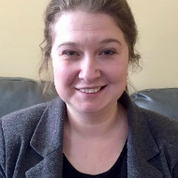Find a CBT Therapist
Search through our directory of local clinicians.
Cheri Levinson

Featured Therapist Interview
Cheri Levinson is an Assistant Professor in the Department of Psychological and Brain Sciences at the University of Louisville and Director of the Eating Anxiety Treatment (EAT) lab. She is also the Clinical Director of the Louisville Center for Eating Disorders, where she treats clients, and supervises and trains other clinicians and students in evidence-based treatments for eating disorders.
Dr. Levinson’s research focuses on (a) understanding the high levels of comorbidity between eating and anxiety disorders and (b) applying empirically supported treatments for anxiety disorders, specifically exposure therapy, to the eating disorders, and (c) using advanced analytic tools and technology to personalize eating disorder treatment. Dr. Levinson has published more than 60 peer-reviewed manuscripts and chapters and has been the primary investigator on several national grants and awards. Dr. Levinson has conducted clinical trials on the effectiveness of using exposure therapy and perfectionism treatment for the eating disorders. She has received several awards, including the 2015 Outstanding Scientific Contribution Award, for her work from the Academy for Eating Disorders.
Dr. Levinson’s clinical works focuses on treating adults and adolescents with eating disorders. She specializes in the treatment of comorbid disorders (eating disorders, OCD, and anxiety disorders) using empirically supported cognitive-behavioral techniques. Dr. Levinson has worked in all levels of eating disorder care, including outpatient, partial-hospitalization, residential, and inpatient care.
Before moving to Louisville, Dr. Levinson trained at the University of North Carolina Center of Excellence in Eating Disorders (CEED). While at CEED, she trained in cognitive behavioral therapies, dialectical behavior therapy, family-based therapy for adolescents with anorexia nervosa, acceptance and commitment therapy, and mindfulness therapies for eating disorders. Dr. Levinson was also a therapist at McCallum Place Eating Disorder Clinic and Webster Wellness Outpatient Clinic, where she treated patients using DBT, CBT, and mealtime therapy, and where she ran several groups, including a perfectionism in the eating disorders group. She also worked at the St. Louis Behavioral Medicine Institute, where she trained in intensive exposure therapy for anxiety disorders and OCD.
Prior to moving to Louisville, Dr. Levinson was a post-doctoral fellow at the Washington University in St. Louis School of Medicine Department of Psychiatry, where she developed technology-based treatments for eating disorders. She completed her clinical internship at the University of North Carolina School of Medicine. She received her Master’s and Doctoral degrees in the psychology department at Washington University in St. Louis. She completed her undergraduate degree in psychology and history at the University of Kentucky.
First, we would like to know a little about your practice.
What are your personal strengths as a practitioner?
I think one of my personal strengths is the ability to empathize and understand what my patients are experiencing. Having worked in all levels of eating disorder care for several years now I have seen the entire spectrum of severity and have had many experiences where I get to hear from the patient (and family) perspective. Additionally, one of my strengths is using science to inform my practice. Because I continue to conduct research, this informs my practice and gives me a unique perspective on my patients, that is fully informed by cutting-edge research.
What “tips” can you offer to colleagues just opening a practice?
Get to know the community. This helps determine what types of services are needed and also helps build a referral base.
How do you remind your patients of their strengths during the therapy process?
I always like to point out progress. Working with eating disorders, many times the progress gets lost behind the challenges, especially because progress can sometimes be extremely slow. What may seem like a huge win to me as the provider is often not seen as a win by the patient. This is extremely important for maintaining motivation in an already low-motivation illness.
Are you involved in other types of professional activities in addition to your private practice?
I am an Assistant Professor at the University of Louisville and run a large research lab. I am also a member of the Academy for Eating Disorders Advocacy Committee and am involved with the National Eating Disorder Association.
When not practicing CBT, what do you do for fun?
Spend time with my two year old daughter, Sofia : We like to go to music class and on walks around the neighborhood.
What do you think is the single most important thing CBT can do for your clients?
Teach them that they can approach emotions and experiences that help them live the life they want.
Where do you see the field of the behavioral therapies going over the next 3-5 years?
I think we will hopefully see a huge shift toward personalized treatments, where we are using evidence-based treatments to target the most important symptoms for each one of our clients.
How do you use the local or social media to educate your community on the benefits of CBT?
I give a talk to the community/professionals on eating disorders about once a month. I also teach a class on evidence-based interventions to clinical psychology PhD students and supervise a team of PhD students learning evidence-based treatments for eating disorders and anxiety disorders.
How long have you been a member of ABCT?
I have been a member of ABCT since my first year of graduate school! I haven’t missed a single conference since my second year of graduate school.
How has ABCT helped you professionally?
ABCT helps remind me that there is a whole body of professionals who use and support evidence-based treatments.
